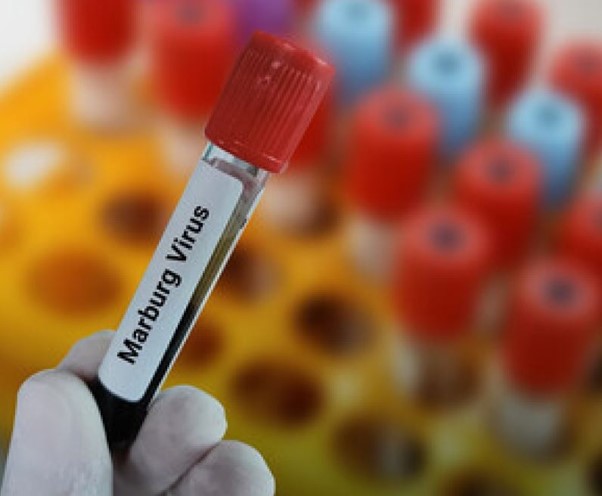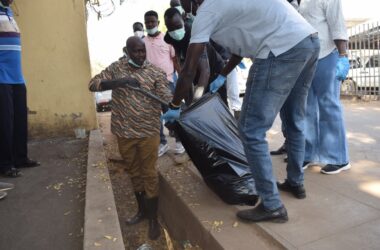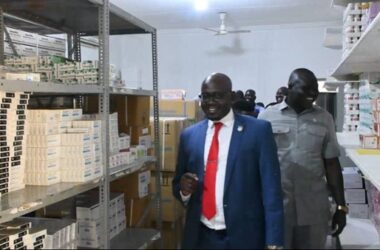By Alan Clement
South Sudan has heightened border surveillance and activated emergency preparedness measures following Ethiopia’s confirmation of a deadly Marburg Virus Disease (MVD) outbreak in Jinka Town.
At a public health briefing on Monday, the Ministry of Health warned that porous crossings and high cross-border movement pose a serious risk of importation.
Ethiopia declared the outbreak on 14 November 2025, a day after Jinka Hospital detected a suspected viral haemorrhagic fever case. Laboratory tests confirmed Marburg virus, with genetic sequencing linking it to earlier East African strains.
“MVD is a severe, highly infectious, and often fatal illness,” Ethiopia’s Ministry of Health noted in a statement.
“Symptoms include sudden fever, fatigue, muscle pain, headache, vomiting, diarrhea, and in later stages, unexplained bleeding. Without timely care, MVD can reach a fatality rate of up to 88 percent,” the statement added.
Marburg Virus Disease is a rare but highly lethal haemorrhagic fever caused by a virus from the same family as Ebola. First identified in 1967 after simultaneous outbreaks in Germany and Serbia linked to imported monkeys, MVD has since appeared sporadically across Africa.
Uganda, Angola, and the Democratic Republic of Congo have all reported deadly outbreaks in the past two decades, with Angola’s 2005 outbreak killing over 200 people. The virus spreads through direct contact with infected bodily fluids, contaminated materials, or exposure to fruit bats which are its natural reservoir.
East Africa’s porous borders, mobile populations, and limited health infrastructure make containment especially challenging.
Although no cases have been reported in South Sudan, authorities stressed the need for vigilance. The Ministry announced intensified surveillance and readiness efforts, urging citizens to remain calm and report suspicious symptoms via the toll-free hotline 6666.
“Our focus now is to prevent any importation and spread of the virus,” the Ministry said.
Over the weekend, the Ministry convened an emergency meeting to coordinate the national response.
Dr. Mabior Kiir Kudior, Chief of Planning and Information at the Public Health Emergency Operations Center (PHEOC), said the team acted immediately despite it being a non-working day. “We acted swiftly because the situation required an immediate response,” Dr. Mabior noted.
Among the first measures was a 72-hour response plan and a travel advisory to guide public safety. National emergency teams have been mobilized for rapid deployment to high-risk counties along the Ethiopian border.
“We are sending response teams on Tuesday to counties including Kapoeta East, Akobo, Pochalla, and Greater Pibor Administrative Area to conduct risk assessments and monitor population movement,” Dr. Mabior explained.
The risk assessment focuses on dynamic conditions along the frontier, where both human and animal movements could facilitate transmission. “So far, Ethiopia has nine confirmed cases, with six deaths a case fatality rate of 66.7 percent,” Dr. Mabior said.
High-risk counties identified for intervention either directly border Ethiopia or lie along major movement corridors, including Narus, Nyangatom, and Pochalla.
The World Health Organization (WHO) confirmed South Sudan’s actions align with international outbreak management standards. Dr. Humphrey Karamagi, WHO Representative for South Sudan, said: “Nine cases so far, six deaths. Two patients remain under treatment, one has recovered. All cases are from the same locality, and we hope containment will hold.”
He praised the Ministry’s structured approach, noting that prevention, detection, and response are the three pillars of the International Health Regulations (2005). “The deployment of teams to the field will strengthen detection capacity,” Dr. Karamagi added.
He added that “Diagnostic kits are already available to support rapid identification and management of suspected cases.”
The Ministry concluded by emphasizing the importance of public trust and vigilance. “The public is encouraged to rely only on official information from the Ministry of Health. Our actions now will determine the country’s safety in the coming days.”




